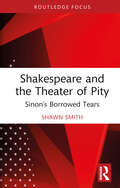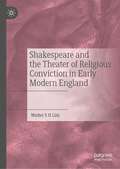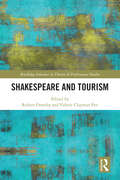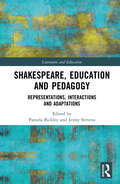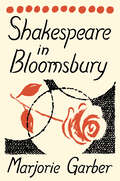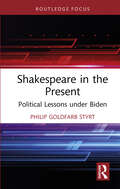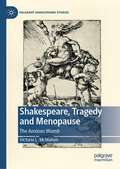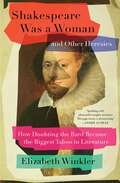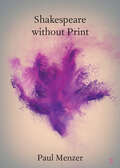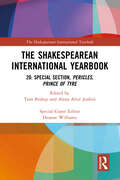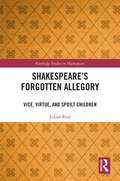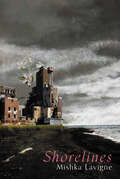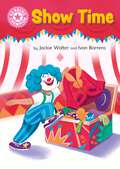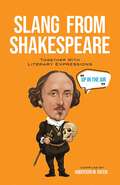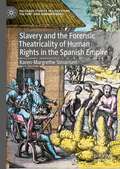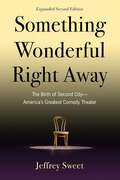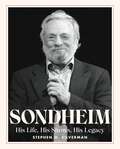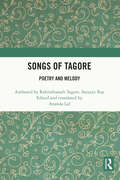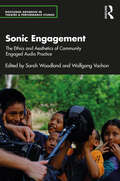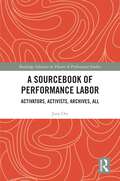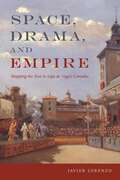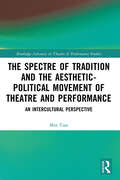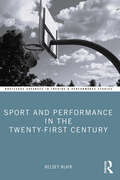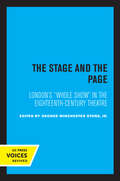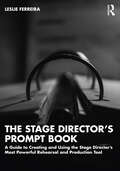- Table View
- List View
Shakespeare and the Theater of Pity: Sinon’s Borrowed Tears (Routledge Focus on Literature)
by Shawn SmithThis volume explores Shakespeare’s interest in pity, an emotion that serves as an important catalyst for action within the plays, even as it generates one of the audience’s most common responses to tragic drama in the theater. For Shakespeare, the word "pity" contained a broader range of meaning than it does in modern English, and was often associated with ideas such as mercy, compassion, charity, pardon, and clemency. This cluster of ideas provides Shakespeare’s characters with a rich range of possibilities for engaging some of humanity’s deepest emotional commitments, in which pity can be seen as a powerful stimulus for fostering social harmony, love, and forgiveness. However, Shakespeare also dramatizes pity’s potential for deception, when the appeal to pity is not genuine, and conceals contrary motives of vengeance and cruelty. As Shakespeare’s works remain relevant for modern audiences and readers, so too does his dramatization of the powerful ways in which emotions such as pity remain essential to our understanding of our shared humanity and of our awareness of compassion’s role in our own private and civic lives.
Shakespeare and the Theater of Religious Conviction in Early Modern England
by Walter S LimThis book analyzes Shakespeare’s use of biblical allusions and evocation of doctrinal topics in Hamlet, Measure for Measure, The Winter’s Tale, Richard II, and The Merchant of Venice. It identifies references to theological and doctrinal commonplaces such as sin, grace, confession, damnation, and the Fall in these plays, affirming that Shakespeare’s literary imagination is very much influenced by his familiarity with the Bible and also with matters of church doctrine. This theological and doctrinal subject matter also derives its significance from genres as diverse as travel narratives, sermons, political treatises, and royal proclamations. This study looks at how Shakespeare’s deployment of religious topics interacts with ideas circulating via other cultural texts and genres in society. It also analyzes how religion enables Shakespeare’s engagement with cultural debates and political developments in England: absolutism and law; radical political theory; morality and law; and conceptions of nationhood.
Shakespeare and Tourism (Routledge Advances in Theatre & Performance Studies)
by Valerie Clayman Pye Robert OrmsbyShakespeare and Tourism provides a dialogical mapping of Shakespeare studies and touristic theory through a collection of essays by scholars on a wide range of material. This volume examines how Shakespeare tourism has evolved since its inception, and how the phenomenon has been influenced and redefined by performance studies, the prevalence of the World Wide Web, developments in technology, and the globalization of Shakespearean performance. Current scholarship recognizes Shakespearean tourism as a thriving international industry, the result of centuries of efforts to attribute meanings associated with the playwright’s biography and literary prestige to sites for artistic pilgrimage and the consumption of cultural heritage. Through bringing Shakespeare and tourism studies into more explicit contact, this collection provides readers with a broad base for comparisons across time and location, and thereby encourages a thorough reconsideration of how we understand both fields.
Shakespeare, Education and Pedagogy: Representations, Interactions and Adaptations (Literature and Education)
by Pamela Bickley Jenny StevensThis volume captures the diverse ways in which Shakespeare interacts with educational theory and practice. It explores the depiction of learning and education in the plays, the role of Shakespeare as pedagogue, and ways in which the teaching of Shakespeare can facilitate discussion of some of the urgent questions of modern times. The book offers a wide range of perspectives – historical, theoretical, theatrical. The Renaissance humanist learning underpinning Shakespeare’s own work is explored in essays that consider how the complexity of Shakespeare’s drama challenges early-modern pedagogical orthodoxies. From close analysis of individual, solitary reflection on Shakespeare’s writing, the book moves outward to engage with contemporary social issues around inclusivity, society, and the planet, demonstrating the many educational contexts in which Shakespeare is currently appropriated. Engaging with current questions of the value of literary study, the book testifies to the potentialities of an empowering Shakespearean pedagogy. Bringing together voices from a variety of institutions and from a wide range of educational perspectives, this volume will be essential reading for academics, researchers and post-graduate students of Shakespeare, literature in education, pedagogy and literary theory.
Shakespeare in Bloomsbury
by Marjorie GarberThe untold story of Shakespeare&’s profound influence on Virginia Woolf and the rest of the Bloomsbury Group &“A spirited dance of minds.&”—Chris Vognar, Boston Globe For the men and women of the Bloomsbury Group, Shakespeare was a constant presence and a creative benchmark. Not only the works they intended for publication—the novels, biographies, economic and political writings, stage designs and reviews—but also their diaries and correspondence, their gossip and small talk turned regularly on Shakespeare. They read his plays for pleasure in the evenings, and on sunny summer afternoons in the country. They went to the theater, discussed performances, and speculated about Shakespeare&’s mind. As poet, as dramatist, as model and icon, as elusive &“life,&” Shakespeare haunted their imaginations and made his way, through phrase, allusion, and oblique reference, into their own lives and art. This is a book about Shakespeare in Bloomsbury—about the role Shakespeare played in the lives of a charismatic and influential cast, including Virginia and Leonard Woolf, Vanessa Bell, Clive Bell, Roger Fry, Duncan Grant, Lytton Strachey, John Maynard Keynes and Lydia Lopokova Keynes, Desmond and Molly MacCarthy, and James and Alix Strachey. All are brought to sparkling life in Marjorie Garber&’s intimate account of how Shakespeare provided them with a common language, a set of reference points, and a model for what they did not hesitate to call genius. Among these brilliant friends, Garber shows, Shakespeare was in effect another, if less fully acknowledged, member of the Bloomsbury Group.
Shakespeare in the Present: Political Lessons under Biden (Routledge Focus on Literature)
by Philip Goldfarb StyrtShakespeare in the Present: Political Lessons under Biden is the first case study in applying the lessons of Shakespeare’s plays to post-Trump America. It looks at American politics through the lens of Shakespeare, not simply equating figures in the contemporary world to Shakespearean characters, but showing how the broader conditions of Shakespeare’s imagined worlds reflect and inform our own. Clearly written, in a direct and engaging style, it shows that reading Shakespeare with our contemporary Washington in mind can enrich our understanding of both his works and our world. Shakespeare wrote for his own time, but we always read him in our present. As such, the way we read him now is always affected by our own understanding of our own political world. This book provides quick critical analyses of Shakespeare’s plays and contemporary American politics while serving as an introduction for undergraduates and general readers to this kind of topical, presentist criticism of Shakespeare.
Shakespeare, Tragedy and Menopause: The Anxious Womb (Palgrave Shakespeare Studies)
by Victoria L. McMahonShakespeare was not only aware of the socio-cultural fears and anxieties generated by the older woman’s body but with the characterization of his tragic ageing females, Shakespeare becomes the first literary giant to explore the physiological and psychosocial condition that we have come to know as ‘menopause’. Although ‘menopause’ was not defined as a medical, physiological or sociocultural event for the early moderns, this book argues that such a medical and cultural transition can, in fact, be identified by sub-textual clues distinguished by various embodied anxieties. It explores several ageing women of the Shakespearean tragedies as they transition through this liminal menopausal period. Theoretically underscored by humoral theory, the analysis is metonymically centered upon the womb as the seat of menopausal anxiety. These menopausal undercurrents, not only permeate the dramatic action of each play, but also emanate outward to reflect the medical, physiological, cultural, social, and religious concerns generated by the ageing woman of the early modern period at large.
Shakespeare Was a Woman and Other Heresies: How Doubting the Bard Became the Biggest Taboo in Literature
by Elizabeth WinklerAn &“extraordinarily brilliant&” and &“pleasurably naughty&” (André Aciman) investigation into the Shakespeare authorship question, exploring how doubting that William Shakespeare wrote his plays became an act of blasphemy…and who the Bard might really be.The theory that Shakespeare may not have written the works that bear his name is the most horrible, unspeakable subject in the history of English literature. Scholars admit that the Bard&’s biography is a &“black hole,&” yet to publicly question the identity of the god of English literature is unacceptable, even (some say) &“immoral.&” In Shakespeare Was a Woman and Other Heresies, journalist and literary critic Elizabeth Winkler sets out to probe the origins of this literary taboo. Whisking you from London to Stratford-Upon-Avon to Washington, DC, she pulls back the curtain to show how the forces of nationalism and empire, religion and mythmaking, gender and class have shaped our admiration for Shakespeare across the centuries. As she considers the writers and thinkers—from Walt Whitman to Sigmund Freud to Supreme Court justices—who have grappled with the riddle of the plays&’ origins, she explores who may perhaps have been hiding behind his name. A forgotten woman? A disgraced aristocrat? A government spy? Hovering over the mystery are Shakespeare&’s plays themselves, with their love for mistaken identities, disguises, and things never quite being what they seem. As she interviews scholars and skeptics, Winkler&’s interest turns to the larger problem of historical truth—and of how human imperfections (bias, blindness, subjectivity) shape our construction of the past. History is a story, and the story we find may depend on the story we&’re looking for. &“Lively&” (The Washington Post), &“fascinating&” (Amanda Foreman), and &“intrepid&” (Stacy Schiff), Shakespeare Was a Woman and Other Heresies will forever change how you think of Shakespeare…and of how we as a society decide what&’s up for debate and what&’s just nonsense, just heresy.
Shakespeare without Print (Elements in Shakespeare Performance)
by Paul MenzerEverything we know about Shakespeare – his world, his words, his work – is preconceived by print. This knowledge extends to cultural expressions that seek to evade ink, paper, and moveable type, such as performance, such as acting. Print privileges qualities quite alien to performance, however: standardization, reproducibility, and, above all, uniformity. Thus the master tropes of print occlude rather than clarify our thinking about acting. How might we think about Shakespeare and performance without print? Examining texts both early and modern, Shakespeare without Print contends that Shakespeare and performance has long been dominated by a medium alien to its expression, print, a foreign government that forecloses alternative conceptualizations and practices. Through a series of discrete but linked excursions into the relationship between Shakespearean print and Shakespearean performance, this Element auditions alternative prepositions to enfranchise scholars and practitioners from print, which currently binds and determines our various approaches to Shakespearean performance.
The Shakespearean International Yearbook: 20: Special Section, Pericles, Prince of Tyre (The Shakespearean International Yearbook)
by Tom Bishop Alexa Alice Joubin Deanne WilliamsThis year publishing its twentieth volume, The Shakespearean International Yearbook surveys the present state of Shakespeare studies, addressing issues that are fundamental to our interpretive encounter with Shakespeare’s work and his time, across the whole spectrum of his literary output. Contributions are solicited from scholars across the field, from both hemispheres of the globe. New trends are evaluated from the point of view of established scholarship, and emerging work in the field is encouraged. Each issue includes a special section under the guidance of a specialist Guest Editor, along with coverage of the current state of the field in other aspects. An essential reference tool for scholars of early modern literature and culture, this annual publication captures, from year to year, current and developing thought in Shakespeare scholarship and theater practice worldwide. There is a particular emphasis on Shakespeare studies in global contexts.
Shakespeare’s Forgotten Allegory: Vice, Virtue, and Spoilt Children (Routledge Studies in Shakespeare)
by Julian RealShakespeare’s Forgotten Allegory posits three startling points: that we have today forgotten a cultural icon that helped to bring about the Renaissance; that this character, used to distil classical wisdom regarding how to raise children to become moral adults, consistently appeared in plays performed between 1350 and 1650; and that the character was often utilised by the likes of Shakespeare and Ben Jonson, and therefore adds a long-forgotten allegorical narrative to their works. This evidence-based reappraisal of some of the most iconic works in Western literature suggests that a core element of their content has been ‘lost’ for centuries. This text will appeal to anyone with an interest in late medieval and early modern drama, especially the works of Shakespeare; to those interested in the history of teaching and child-rearing; to anyone curious about the practical application of philosophy in society; to anyone that would like to know more about the crucial and defining period today known as the Renaissance, and how and why society was redesigned by those with influence; and to all those who would like to know more about how history, which though sometimes misplaced, continues to influenced our modern world.
Shorelines
by Mishka LavigneA small military-occupied community sits, waiting, parched of natural water while nearby levees hold the rising global shoreline. Seventeen-year-old twins Alix and Evan pass the time in an empty, abandoned pool with what they are able to scavenge from the abandoned houses, while government official Portia returns to familiar places, her past colliding with the present. The planned evacuation notice that eventually reaches all cities has finally come, but the twins learn that survival is not guaranteed. As they rush to reach their grandmother, a retired journalist now living with dementia, her snippets of memories flow like humanity’s record player, skipping tracks before the final flood.A non-linear poetic play that acts like a postcard from the future, Shorelines is about family and community in a world ravaged by climate change. It also speaks to the inevitable inequality of disaster response and how poorer communities are disproportionately affected by it. Mishka Lavigne’s message within her lyrical piece is urgent and multi-dimensional: it is a reminder that all things are connected and hope can only lie in the relationships we form with the people around us.
Show Time: Independent Pink 1b (Reading Champion #610)
by Jackie WalterThis story is part of Reading Champion, a series carefully linked to book bands to encourage independent reading skills, developed with Dr Sue Bodman and Glen Franklin of UCL Institute of Education (IOE)Reading Champion offers independent reading books for children to practise and reinforce their developing reading skills.Fantastic, original stories are accompanied by engaging artwork and a reading activity. Each book has been carefully graded so that it can be matched to a child's reading ability, encouraging reading for pleasure.
Slang from Shakespeare: Together with Literary Expressions
by Anderson M. Baten“It was Greek to me.” This handy reference showcases William Shakespeare’s genius, compiling over 1,500 of his most famous epigrams, invectives, literary expressions, and philosophical poems that have found their way into our everyday vernacular.
Slavery and the Forensic Theatricality of Human Rights in the Spanish Empire (Palgrave Studies in Literature, Culture and Human Rights)
by Karen-Margrethe SimonsenThis book is a study of the forensic theatricality of human rights claims in literary texts about slavery in the sixteenth and the nineteenth century in the Spanish Empire. The book centers on the question: how do literary texts use theatrical, multisensorial strategies to denunciate the violence against enslaved people and make a claim for their rights? The Spanish context is particularly interesting because of its early tradition of human rights thinking in the Salamanca School (especially Bartolomé de Las Casas), developed in relation to slavery and colonialism. Taking its point of departure in forensic aesthetics, the book analyzes five forms of non-narrative theatricality: allegorical, carnivalesque, tragicomic, melodramatic and tragic.
Something Wonderful Right Away: The Birth of Second City—America's Greatest Comedy Theater
by Jeffrey SweetDiscover the behind-the-scenes story of how The Second City theater created a generation of world class great actors, directors, and writers. In the late Fifties and Sixties, iconoclastic young rebels in Chicago opened two tiny theaters—The Compass and The Second City—where they satirized politics, religion, and sex. Building scenes by improvising based on audience suggestions turned out to be a fine way to develop great actors, directors, and writers. Alumni went on to create such groundbreaking works as The Graduate, Groundhog Day, and Don&’t Look Up. Many of them also became stars on Saturday Night Live. Something Wonderful Right Away features the pioneers of the empire that transformed American comedy. This new edition tells even more of the story. Included for the first time is an interview with Viola Spolin, the genius who invented theater games that were the foundation of improvisational theater. Also included are dozens of follow-up stories about Mike Nichols, Barbara Harris, Del Close, Joan Rivers, Alan Arkin, and Gilda Radner, plus &“You Only Shoot the Ones You Love,&” the story of how this book&’s author, playwright Jeffrey Sweet, became so involved in the community he covered that he was captured by it.
Sondheim: His Life, His Shows, His Legacy
by Stephen M. SilvermanLively, sophisticated, and filled with first-person tributes and glorious images, Sondheim: His Life, His Shows, His Legacy lifts the curtain on a Broadway legend. "Aside from Sondheim's own exceptional books...this may be the best coffee-table volume devoted to his work."(Shelf Awareness) Brimming with insights from a veritable Who's Who of Broadway Babies and complemented by more than two hundred color and black-and-white images, Sondheim: His Life, His Shows, His Legacy offers a witty, multidimensional look at the musical genius behind Company, Follies, A Little Night Music, Into the Woods, Sunday in the Park with George, Sweeney Todd, and the landmark West Side Story and Gypsy. Exploring the unique bond between Sondheim and his audiences, author Stephen M. Silverman further examines the challenging Sondheim works that continue to develop devoted new followings: Anyone Can Whistle, Pacific Overtures, Merrily We Roll Along, Assassins, and Passion. The result is a lavish, highly engrossing documentation of the dynamic force who reshaped twentieth-century American musical history.
Songs of Tagore: Poetry and Melody
by Rabindranath Tagore Satyajit RayRabindranath Tagore composed over 2000 songs that are revered and sung by Bengalis everywhere. However, they remain mostly unknown to listeners from other communities. This book brings the Nobel Laureate’s unique music — Rabindrasangit — to a global audience, with a lucid introduction by Ananda Lal as well as selected songs in international transcription and English translation. It includes an essay written originally in Bengali by the celebrated filmmaker Satyajit Ray, himself a Tagore student and music composer. Ray presents his thoughts on Rabindrasangit, its nuances, music, history, and usage. Lal has also translated this essay into English for the first time. The book also presents for the first time faithful staff notations of all 41 songs in three of Tagore’s major plays — Rakta-karavi, Tapati, and Arup Ratan — providing a thematic unity to the music section. This volume will be of interest to Tagore and Ray enthusiasts and specialists, musicologists, and students of music, theatre, literature, performance studies, and cultural studies. It will appeal not only to scholars but to general readers wanting to know more about Tagore’s songs, as well as directors, arrangers, composers, and singers who may wish to perform or interpret the songs transcribed.
Sonic Engagement: The Ethics and Aesthetics of Community Engaged Audio Practice (Routledge Advances in Theatre & Performance Studies)
by Sarah Woodland Wolfgang VachonSonic Engagement examines the relationship between community engaged participatory arts and the cultural turn towards audio, sound, and listening that has been referred to as the 'sonic turn'. This edited collection investigates the use of sound and audio production in community engaged participatory arts practice and research. The popularity of podcast and audio drama, combined with the accessibility and portability of affordable field recording and home studio equipment, makes audio a compelling mode of participatory creative practice. This book maps existing projects occurring globally through a series of case study chapters that exemplify community engaged creative audio practice. The studies focus on audio and sound-based arts practices that are undertaken by artists and arts-led researchers in collaboration with (and from within) communities and groups. These practices include—applied audio drama, community engaged podcasting, sound and verbatim theatre, participatory sound art, community-led acoustic ecology, sound and media walks, digital storytelling, oral history and reminiscence, and radio drama in health and community development. The contributors interrogate the practical, political, and aesthetic potentialities of using sound and audio in community engaged arts practice, as well as its tensions and possibilities as an arts-led participatory research methodology. This book provides the first extensive analysis of what sound and audio brings to participatory, interdisciplinary, arts-led approaches, representing a vital resource for community arts, performance practice, and research in the digital age.
A Sourcebook of Performance Labor: Activators, Activists, Archives, All (Routledge Advances in Theatre & Performance Studies)
by Joey OrrA Sourcebook of Performance Labor presents the views and experiences of collaborators in other artists’ works. This book reorients well-known works of contemporary performance and social practice around the workers who have shaped, enacted, and supported them. It emerges from perspectives on maintenance, care, affective labor, and the knowledges created and preserved through gesture and intersubjectivity. This compilation of interviews is filled with the voices of collaborators in notable works attributed to established contemporary artists, including Francis Alÿs, Tania Bruguera, Suzanne Lacy, Ernesto Pujol, Asad Raza, Dread Scott, and Tino Sehgal. In the spirit of the artworks under discussion, this book reinvests in the possibilities for art as a collective effort to explore new ways of finding ourselves in others and others in ourselves. The Sourcebook collection is a contribution for further theorizing a largely unaddressed perspective in contemporary art. This collection will be of great interest to students and scholars in performance studies and art history.
Space, Drama, and Empire: Mapping the Past in Lope de Vega's Comedia (Campos Ibéricos: Bucknell Studies in Iberian Literatures and Cultures)
by Javier LorenzoSpanish poet, playwright, and novelist Félix Lope de Vega (1562–1635) was a key figure of Golden Age Spanish literature, second only in stature to Cervantes, and is considered the founder of Spain’s classical theater. In this rich and informative study, Javier Lorenzo investigates the symbolic use of space in Lope’s drama and its function as an ideological tool to promote an imagined Spanish national past. In specific plays, this book argues, historical landscapes and settings were used to foretell and legitimize the imperial present in Hapsburg Spain, allowing audiences to visualize and plot, as on a map, the country’s expansionist trajectory throughout the centuries. By focusing on connections among space, drama, and empire, this book makes an important contribution to the study of literature and imperialism in early modern Spain and equally to our understanding of the role and political significance of spatiality in Siglo de Oro comedia.
The Spectre of Tradition and the Aesthetic-Political Movement of Theatre and Performance: An Intercultural Perspective (Routledge Advances in Theatre & Performance Studies)
by Min TianThis book interrogates anew the phenomenon of tradition in a dialogical debate with a host of Western thinkers and critical minds. In contrast to the predominantly Western approaches, which look at traditions (Western and non-Western) from a predominantly (Western) modernist perspective, this book interrogates, from an intercultural perspective, the transnational and transcultural consecration, translation, (re)invention, and displacement of traditions (theatrical and cultural) in the aesthetic-political movement of twentieth-century theatre and performance, as exemplified in the case studies of this book. It looks at the question of traditions and modernities at the centre of this aesthetic-political space, as modernities interculturally evoke and are haunted by traditions, and as traditions are interculturally refracted, reconstituted, refunctioned, and reinvented. It also looks at the applicability of its intercultural perspective on tradition to the historical avant-garde in general, postmodern, postcolonial, and postdramatic theatre and performance and to the twentieth-century "classical" intercultural theatre and the twenty-first-century "new interculturalisms" in theatre and performance. To conclude, it looks at the future of tradition in the ecology of our globalized theatrum mundi and considers two important interrelated concepts, future tradition and intercultural tradition. This book will be of great interest to students and scholars in performance studies.
Sport and Performance in the Twenty-First Century (Routledge Advances in Theatre & Performance Studies)
by Kelsey BlairAnalyzing sport through the lens of performance and theorizing performance through the lens of sport, Sport and Performance in the Twenty-First Century offers a field intervention, a series of in-depth performance analyses, and an investigation of the intersection between sport performances and public life in the historical present in the global north. The objectives of this book are three-fold. First, the book advocates for the study of sport in the fields of Theatre and Performance Studies and, through in-depth performance analyses, demonstrates how the critical language and methods of performance studies help illuminate the manifold impacts of the practices, activities, and events of sport. Second, the book introduces new critical language that was originally developed in conjunction with sport but is also designed for cross-genre performance analysis. In introducing novel terminology, the book aims to simultaneously facilitate analysis of sport performances and to demonstrate how the study of sport can contribute to the fields of Theatre and Performance Studies. Finally, the book investigates the epistemological, affective, and socio-political effects of sport performances in order to illuminate how sport performances influence, and are influenced by, their historical conditions. This study will be of great interest to students and scholars in Theatre and Performance Studies, Physical Culture Studies, and Socio-Cultural Sports Studies.
The Stage and the Page: London's Whole Show in the Eighteenth-Century Theatre (Clark Library Professorship, UCLA #6)
by Geo. Winchester StoneThis title is part of UC Press's Voices Revived program, which commemorates University of California Press’s mission to seek out and cultivate the brightest minds and give them voice, reach, and impact. Drawing on a backlist dating to 1893, Voices Revived makes high-quality, peer-reviewed scholarship accessible once again using print-on-demand technology. This title was originally published in 1981.
The Stage Director’s Prompt Book: A Guide to Creating and Using the Stage Director’s Most Powerful Rehearsal and Production Tool
by Leslie FerreiraThe Stage Director’s Prompt Book is a step-by-step, detailed guide on how to create a practical and powerful rehearsal and performance tool—the director’s prompt book. A prompt book is a coordinating and organizational tool for the stage director. This book systematizes the creative process the director uses to analyze and interpret a play and coordinates all director-related rehearsal and production activities into a single, self-contained interpretive and organizational system. This book guides the director through the necessary steps and stages of creating and using a prompt book—from play analysis and interpretation, through the formation of a dynamic and theatrical director’s vision, to a unique method of physicalizing a play in production. A prompt book of a one-act play is included in the book as a complete example of the system. Such techniques as redlining, color coding and creating a three-column left-hand page are vividly illustrated for readers, allowing them to assemble their own prompt books. In a clear and example-driven format, The Stage Director’s Prompt Book offers a system of directorial interpretation that takes the director through a series of point-by point instructions to construct a strong, effective and creative instrument for success. For the undergraduate and graduate student of theatre directing, stage management and producing courses, along with aspiring professional directors, this book provides an interactive and intuitive approach to personalize the stage directing experience and assemble a graphically dynamic and creative director’s prompt book.
